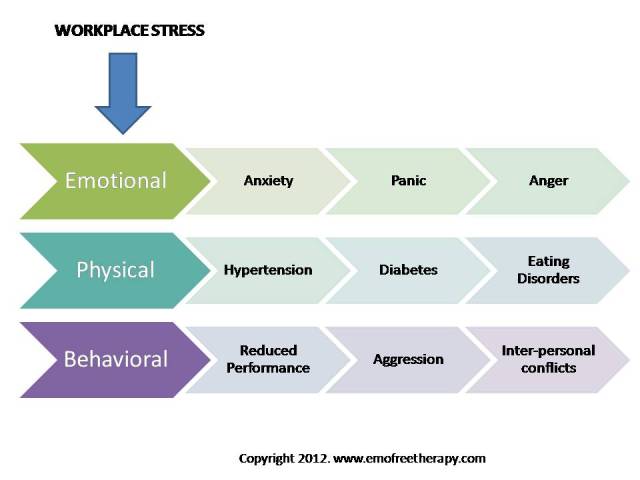Stress is the reaction to internal and external factors that surpasses an individual?s ability to cope. It varies from person to person.
Stress has a threefold impact in the workplace ? Emotional, physical and behavioral. A simple example would be that job stress can lead to irritability, anxiety, panic (emotional), elevated blood pressure (physical) and frequent anger outbursts at home and in office (behavioral).
 Stress inducing factors in the Corporate
Stress inducing factors in the Corporate
- Continuous worry about projects, deadlines, and performance assessments.
- Pressure to perform & low job satisfaction.
- Grievances and frequent ego clashes with their bosses or colleagues
- Anxiety due to downsizing, layoffs & management changes.
- The work hours have increased which reduces time to decompress and creates a constant and never-reducing stress factor.
- Continual stress can cause burnout and anger towards oneself and others.
- Increased Workload ? The list of things to do creates a feedback loop where the employee starts stressing about the number of things to be done, and in the process is unable to effectively perform his/her current tasks.
- Flexibility to work from home does not necessary translate into better work-life balance, because the definition of end of work day gets blurred. All people get is flexibility, not reduced hours of work ? all this contributing to increased stress, more than people can cope with.
- Stress related physical issues such as diabetes, hypertension, eating disorders, stroke etc.
Stress affecting the organization ? It drains the human resources and causes loss of productivity.
- Stress takes a toll on the emotional and physical health leading to frequent absenteeism & poor performance that can have a direct impact on the productivity of the company.
- Poor communication and inter- personal conflicts amongst team members leading to missed deadlines.
- Burnout leading to increasing dropouts.
Stress management classes will help to
- Identify the sources and triggers of stress,
- Apply Emotional Freedom techniques (EFT) ? a self help tool for releasing stress.
Emotional Freedom Techniques (EFT) - It is a compelling?self?help tool for stress management.? It?reduces high stress?levels, decreases?anxiety & chronic worry and in the long run helps in decreasing the effects of stress on emotional and physical health. EFT can empower employees handle their personal stressors, both physical and emotional.
Learning EFT will help employees to,
- Quickly de-stress during and after work hours.
- Reduce anxiety, worry, frustration, lack of energy etc ? all symptoms of stress.
- Improve communication skills.
- Reduce inter-personal conflicts.
- Improve upon the areas where they face difficulties. For example ? fear of public speaking.
- Reduce the deleterious effects on stress on physical health.
- Get emotional harmony in the workplace,
In essence, EFT helps in having more efficient employees in better working conditions.
?
?
I am a Counseling Psychologist and a Certified EFT Practitioner. I consider EFT combined with counseling to be a wonder tool. In my 8 years of experience I have effectively used EFT and Counseling to heal emotional and physical problems. With great regularity EFT enables people to achieve inner peace. Give it a try and experience its benefits. This entry was posted in Communication, EFT, Job Stress and tagged anxiety, burnout, Corporate Stress, EFT, employees stress, pressure, productivity, stress, working hours, workload, Workshop. Bookmark the permalink.Source: http://eftforpeace.wordpress.com/2012/09/26/workplace-stress-management/
iau msft etan patz obama dog doug hutchison larry brown thomas kinkade
No comments:
Post a Comment
Note: Only a member of this blog may post a comment.